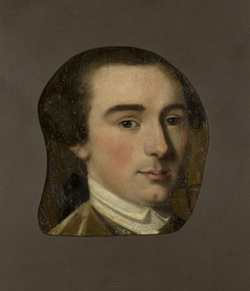“Going to Mendon to put himself under the Care of Dr. Pope”
On 15 April, news came that the lump “came out in a Body, near of the Bigness and Shape of a Sheeps Kidney.”
It’s not clear whether the Forbeses were still in Boston when the war began four days later. If so, they still had access to Dr. Pope, but he might not have had the materials to make his medicines. And of course there were the dangers of attack and starvation.
The Forbeses may have left just before the war began or soon after, but in any case they were in the countryside by June. So was Dr. Pope. On 30 June Mary’s father, the Rev. Ebenezer Parkman, wrote in his diary:
My Daughter Forbes goes to Mendon in search of her Doctor, Pope: her Breast has Twinges, and she wants some of his [??] salve.On 19 July, Isaiah Thomas’s Massachusetts Spy, now relocated to Worcester, published this notice:
This is to inform the public, that John Pope who of late years hath been much noted for curing inveterate Cancers, and the most malignant Ulcers at Boston, hath by reason of the deplorable situation of that town removed to Mendon, where any who want his assistance may by enquiring at George Aldrich’s of said Mendon find the place of his Residence.Aldrich (1715–1797) was a Quaker, son of a prominent Quaker preacher.
On 13 September, Parkman reported on a sermon, adding: “Mr. Forbes [and Mrs. Forbes?] (having been to Dr. at Mendon about her Breast) came.”
Pope continued to have a reputation as a healer, and on 17 Feb 1776 the minister wrote: “Mr. Edwards Whipple here. He has a Cancer on his Lip—is going to Mendon to put himself under the Care of Dr. Pope—and desires public prayers tomorrow for him.”
However, by that time Mary Forbes was dead. On 19 January her father wrote:
Billy comes from Concord—with The Heavy News, and Letter from my dear son Forbes! Of my most dear Child Mary’s Departure on the 16th at Eve, between 9 and 10 o’Clock! O Lord, Help!Mary Forbes was fifty years old when she died.
The Rev. Eli Forbes married three more times, and his last wife was Mary’s younger sister Lucy, who by that time was widow of the military engineer Jeduthan Baldwin.
TOMORROW: John Pope’s travels.
(The picture above shows Gloucester’s first meetinghouse as depicted by Fitz Henry Lane.)
















